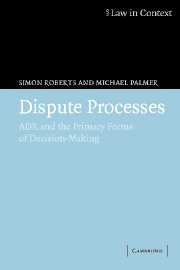Book contents
- Frontmatter
- Contents
- Preface
- Acknowledgements
- 1 Introduction
- 2 Cultures of Decision-making: Precursors to the Emergence of ADR
- 3 The Debates Around Civil Justice and the Movement Towards Procedural Innovation
- 4 Disputes and Dispute Processes
- 5 Negotiations
- 6 Mediation
- 7 Umpiring
- 8 Hybrid Forms and Processual Experimentation
- 9 The Trajectory of Alternative Dispute Resolution
- Bibliography
- Index
1 - Introduction
Published online by Cambridge University Press: 05 June 2012
- Frontmatter
- Contents
- Preface
- Acknowledgements
- 1 Introduction
- 2 Cultures of Decision-making: Precursors to the Emergence of ADR
- 3 The Debates Around Civil Justice and the Movement Towards Procedural Innovation
- 4 Disputes and Dispute Processes
- 5 Negotiations
- 6 Mediation
- 7 Umpiring
- 8 Hybrid Forms and Processual Experimentation
- 9 The Trajectory of Alternative Dispute Resolution
- Bibliography
- Index
Summary
‘… impressed with command, we see little else.’
C Geertz Negara (1982: 121)‘… there probably exists no social unit in which convergent and divergent currents among its members are not inseparably interwoven.’
G Simmel Der Streit (1908: trs 1955: 15)Prologue
Across the world, there are disagreements between neighbours, family members, affines, colleagues and others. The manner in which quarrel situations are characterised, and the ways in which the particular modes of response are regarded, varies from society to society – indeed, also from group to group within any given society. The nature of disputes, the appropriate responses to disputing situations, and the remedies considered proper are inevitably informed by fundamental social values and even cultural identity. This is the starting point for the examination of dispute processes provided in this book below, which also locates current enthusiasms for ‘alternative’ modes of resolving disputes – especially those found in the United Sates and other parts of the Anglo-American common law world – in a wider comparative framework.
Shifting Ground in the Common Law World
Thirty years ago we could have said with reasonable confidence, in the common law world, what the principal institutions of public disputing ‘were’. Over a long period, judges and lawyers had progressively become central, well-defined agents of public dispute management. The former held out the beautiful promise of an authoritative third-party decision; the latter, as both advisers and champions, presented themselves as essential companions along the arduous route of litigation.
- Type
- Chapter
- Information
- Dispute ProcessesADR and the Primary Forms of Decision-Making, pp. 1 - 8Publisher: Cambridge University PressPrint publication year: 2005
- 1
- Cited by

